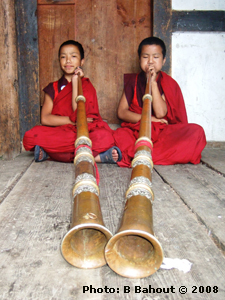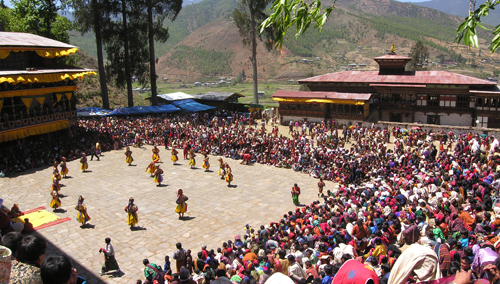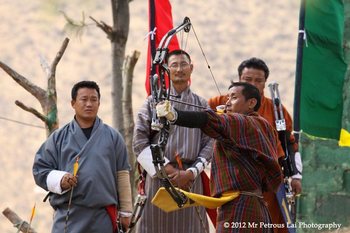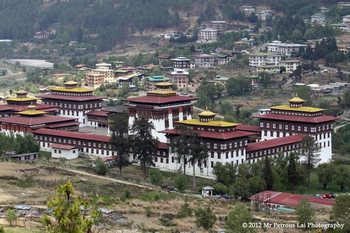Home > Destinations > Asia > Bhutan > Festivals
TRADITIONAL FESTIVALS (TSECHUS) IN BHUTAN
"策秋節"
Festivals in the Land of the Thunder Dragon are a big family and social occasion. People dress up in their finest clothes and most resplendent jewelry of coral and turquoise. They pack picnic lunches in their traditional bamboo baskets and stay all day at the festivals in the dzongs (fortresses) or at monasteris. All Bhutanese try to attend a festival at least once in a lifetime, and out of all, it is an important annual affair where they consider it a blessing to be able to watch the dances.
At different time of the year, the annual festivals known as "Tsechus" 策秋 take place in different locations. These Tsechus are festivals extolling the great deeds of Guru Padmasambhava also known as Guru Rinpoche, the saint who brought Buddhism to Bhutan and the Himalayan world.. Festivals are celebrated for several days averaging between three to five days and are the occasion for dances that are purley defined in religious content.
These Tsechus are held in almost every district attracting hundreds of Bhutanese people in a spirit of festivity, celebration and deep faith. The Tsechus have spiritual connotations, and Buddhist practitioners perceive a symbolic communion between dancers and spectators. Those attuned to the faith can feel the spiritual powers evoked by the dancers dressed in elaborate, often ancient, costumes, masks and headgear. Apart from monk dancers, community folk dancers and singers also perform during Tsechus. The Buddhist people consider it a blessing lto be able to watch the danes.
Tsechus are held on auspicious days, on the tenth day of the Bhutanese month, and last up to four days in which a series of highly stylised masked dances rituals are performed. The dances are well known and loved by the Bhutanese who come dressed in their best for the very special social occasion for all Bhutanese families.
One of the highlights for a visit to Bhutan is to attend a tsechu or festival held at major dzong. The festivals in Bhutan have reputations for being raucous, joyous affairs. The most popular for tourists are those held in Thimphu, Paro and Bumthang . Due to the high number of tourists at this time demand for accommodation is extremely high so specific hotels cannot always be confirmed in advance and there can be last-minute changes to itineraries.
 The dzongs (fort-monastery) come to life with color, music and dancing as valley dwellers and townsfold dress in their finest clothes and join together to exorcise evil spirits and rejoice in a new harvest. Rare masked and sword dances and other rituals are performed in dzong courtyards and temples.
The dzongs (fort-monastery) come to life with color, music and dancing as valley dwellers and townsfold dress in their finest clothes and join together to exorcise evil spirits and rejoice in a new harvest. Rare masked and sword dances and other rituals are performed in dzong courtyards and temples.
Most of the dances date back from before the middle ages and are only performed once or twice each year. Each dance has its own spiritual importance and can be performed by monks or lay village elders dressed in bright costumes. Certain festivals end with the unveiling and worship of hugh religious appliques or throngdrels. The moment of the unveiling is shrouded in secrecy and creates great excitement among all the participants.
Thimphu and Paro festivals are the most popular for tourists as they are most accessible. There are other regional dromches and tsechus each year taking place in different localities of the kingdom and these are equally fascinating. The tsechus at Bumthang is well known for taking place almost entirely during the evening and containing exciting fire and fertility dances.
One of the largest festivals is the Thimphu Tsechu in the capital where thousands of people attend for four days of dances and prayer. Should you prefer a more intimate experience, there are many tsechus in the smaller districts which are less crowded and the local atmopshere is more relaxed and enjoyable. This is also the best way for you to get acquainted with the spirit of Bhutan.
Tourists are allowed into the dzongs to watch the festivals, but are not allowed into the inner sanctuaries. Photography should always be discreet. It is generally allowed for photographs to be taken at tsechus but not at dromches.
If you wish to visit a festival during your time in Bhutan please book early in advance and take plenty of film or memory card as the vibrant dances are a riot of color and a photographer's delight.
Holiday & Special Event
 Bhutan's national day is 17 December, the date of the establishment of the monarchy in 1907. Other important holidays are the king's birthday on 11 November and Coronation Day on 02 June.
Bhutan's national day is 17 December, the date of the establishment of the monarchy in 1907. Other important holidays are the king's birthday on 11 November and Coronation Day on 02 June.
The new year is called "Losar", and is celebrated according to the highly complicated Bhutanese calendar. Losar usually falls between mid-January and mid-March. To complicate matters further, there are different dates for the new year in various parts of the country.
Festivals are schedule according to the Bhutanese calender. Dates can be predicated in advance to within one or two weeks, but determining the precise dates requires a consultation with an astrologer. TAB prepares a list, usually in June, of the correct festival dates for the following year and distributes it to all tour operators.
Bhutanese Calendar
The Bhutanese calendar is based on the Tibetan calendar, which evolved from the Chinese. In the 17th century the Bhutanese scholar Pema Karpo developed a new way of computing the days of the week. This caused a divergence between the Tibetan and Bhutanese calendars, and dates do not agree between the two systems.
Cultural Events
Most dzongs and many monasteries have an annual festival, the largest of which is the Tsechu. This is a festival in honour of Guru Rimpoche. The biography of the Guru is highlighted by 12 episoldes on the model of the Buddha Sakyamuni's life. The dates and the duration of the festivals vary from one district to another but they always take place on or aroudn the 10th day of the month in the Bhutanese calendar.
The dances of the tsechu are performed by monks as well as lay people. Many of the dances were composed by the Shabdrung Ngawang Namgyal and Pema Lingpa. The dancers take on the aspects of wrathful and compassionate deities, heroes, demons, and animals. The dances, known as cham, bring blessings upon the onlookers, to instruct them in the teachings of the Buddhist dharma, to protect them from misfortune, and to exorcise evil influences. It is a religious festival and it is believed one gains merits by attending it. Deities are involked during the dances; through their power and benediction, misfortunes many be annihilated, luck increased and wishes realised. It is also a yearly social gathering where the people rejoice together, dressed in their finest clothing and jewellery. During the dances atsara (clowns) mimic the dancers and perform comic routines wearing masks with long red noses. The name is a corruption of the Sanskrit acharya (master). While entertaining the onlookers, they also help to keep order and have developed the habit of harassing tourists for money. Take it as a good-natured game; if you contribute you may even receive a blessing from the wooden phallus they carry.
During many tsechus a large thangka (religious picture) is unfurled from the building overlooking the dance area before sunrise. Large thangkas of this sort are called thondrol, and are usually embroidered rather than painted. The word names "liberation on sight", and it is believed that one's sins are washed away simply by viewing one of these large relics. When the throdrol is rolled up again, old people chant to ensure they will see it the following year.
During the intervals between the masked dances a team of elegantly dressed ladies sing and perform traditional dances. During some tsechus a small fair is erected outside the dzong or goemba. Some of the stalls offer various kinds of gambling for astonishingly high stakes.
ALL INFORMATION ARE GIVEN FOR YOUR REFERENCE. THEY ARE SUBJECT TO CHANGE WITHOUT GIVING PRIOR NOTICE.
|
|---|
Newsletter Subscription: 訂閱最新旅遊資訊
Site Map · Privacy Policy 私隱政策(只附英文版)
© 2020 Exotic-Holidays.hk · All Rights Reserved
![]()

